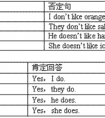—You aren't a stranger, are you?— , don't you rememberme at the school gate ten minutes ago? [ ]A. Yes ; to see B. No ; seeing C. No ; saw D. Yes ; s-九年级英语
It is unfair, isn't it? 这不公平,是吧?
11.含有否定含义的词在陈述部分作动词的宾语时,其反意疑问句用肯定结构,也可以用否定结构。例如:
You got nothing from him, did you? 你从他那儿什么也没得到,是吗?
12. 当陈述部分主语是从句、不定式(短语)、动词-ing形式时,反意疑问句的主语应该用it。 例如:
What you need is more important, isn't it?你需要的东西更重要,是吧?
13. 当陈述部分含I think (believe, suppose...)that... 结构时,其反意疑问句须与从句的主、谓语保持一致,注意主句的主语必须是第一人称。例如:
I don't think he will come, will he? 我认为他不会来,对吗?
14.have(has)不是表示“有”的意思,并在句中做谓语时,其反意疑问句的助动词要用do, does, did。例如:
They had a meeting just now,didn't they? 他们刚才开了个会,是吗?
15. 陈述部分有have to 时,其反意疑问句要用助动词的否定形式。例如:
You have to water the vegetables every day, don't you?你每天都要浇菜,对吧?
16. 陈述部分是there be句型时,其反意疑问句中要用there。例如:
There was a hospital here, wasn't there? 过去这儿有家医院,是吗?
17. 陈述部分有had better时,反意疑问句中要用hadn't。 例如:
We had better go to school at once, hadn't we? 我们现在最好马上去上学,好吗?
18. 当陈述部分含有情态动词must时,我们便要分析一下must的含义。如果must 作“一定;要;必须”讲,反意疑问句须用mustn't或needn't;
而当must作推测意义“一定 是;必定”讲时,反意疑问句则需根据must后的动词原形选用相应的形式。例如:
He must work hard at physics, mustn't he? 他必须努力学物理,是吧?
Tom must be at home,isn't he? 汤姆一定在家,是吧?
- 最新内容
- 相关内容
- 网友推荐
- 图文推荐
上一篇:—Dad, why should I stop computer games?—For your health, my boy, I'm afraid you . [ ]A. to play ; must B. playing ; have to C. to play ; can D. playing-九年级英语
下一篇:a top student in his class is pressure for him.[ ]A. Be B. Being C. Is D. / -九年级英语
零零教育社区:论坛热帖子
| [家长教育] 孩子为什么会和父母感情疏离? (2019-07-14) |
| [教师分享] 给远方姐姐的一封信 (2018-11-07) |
| [教师分享] 伸缩门 (2018-11-07) |
| [教师分享] 回家乡 (2018-11-07) |
| [教师分享] 是风味也是人间 (2018-11-07) |
| [教师分享] 一句格言的启示 (2018-11-07) |
| [教师分享] 无规矩不成方圆 (2018-11-07) |
| [教师分享] 第十届全国教育名家论坛有感(二) (2018-11-07) |
| [教师分享] 贪玩的小狗 (2018-11-07) |
| [教师分享] 未命名文章 (2018-11-07) |

![Which of the following can you probably see in the meeting room? [ ]A. B. C.D. -七年级英语](http://www.00-edu.com/d/file/ks/4/2/dongmingci/2020-01-08/small97361980a56115e1c9237567439904fe1578422951.jpg)

![—Can the boy finish_____ the book in about a week? —I think he can. [ ]A. read B. reading C. to read D. reads -八年级英语](http://www.00-edu.com/d/file/ks/4/2/dongmingci/2020-01-08/smallfa4d713075e249356362fe7392193a301578421751.png)


